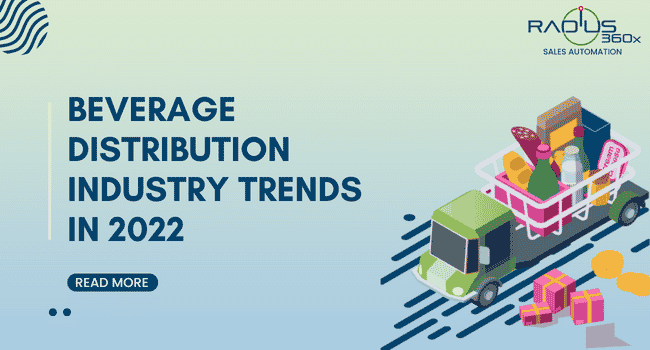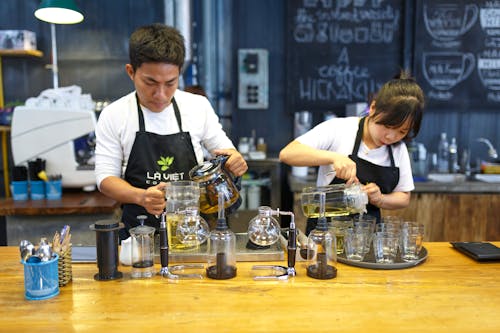
The United States’ beverage industry is worth $146 Billion (including non-alcoholic and alcoholic beverages). The sale of alcoholic beverages brings in around $253 billion each year, and the sale of non-alcoholic beverages generates around $415 million yearly.
The pandemic made businesses realize the importance of digitization. Distributors started adopting technology for their business processes. Due to social distancing and curfews, sellers had to find ways to connect with their buyers and keep selling their goods. This was done through e-commerce websites and social media networks. Digitization was necessary pre-pandemic, too, but it was not mandatory, but things changed.
Also, the increase in consumerism forced businesses to improve their customer service. Customers want fast deliveries, regular updates, answers to queries, and a satisfactory resolution to issues in orders. Today’s customers won’t hesitate to shift to your competitor if unsatisfied with your customer service.
The tested agility of the organizations is high during the pandemic, and their survival depends on how well they adjusted to the changing circumstances. So it’s important to know what are the beverage distribution industry trends that are important to have a competitive edge.

Automation is playing a significant role in businesses today. Business owners are handling inventory, samples, orders, deliveries, etc., with automation and for all the good reasons. Several workflows can be streamlined for the ease of doing business. For example, CRM (Customer relationship management) software can automate follow-up emails sent to your customers. When automation is in use, employees don’t have to waste time doing tedious business tasks, and they can use technology to increase their productivity and speed. Automation also allows beverage distribution businesses to derive valuable insights that help them to make better decisions.
More and more beverage distributors have been adopting digital handling of sales orders. For example, distributors invest in an order management system that tracks orders throughout their lifecycle, from being ordered to being shipped. Customers can order through different channels and update the inventory in real time. Customers also find ordering through e-commerce channels more convenient than physically calling, mailing, or going. Online ordering helps record all orders automatically and improves customer service as customers get updated on every stage of their order’s processing.
People of today are welcoming sustainable alternatives to conventional things. The question arises- Why not choose sustainable packaging wherever we can? This action benefits the environment, society, and business, reduces harmful environmental waste, and enhances the company’s social image. Customers want more transparency about where the products are coming from and what methods the manufacturers use for production. The same responsibility falls on the distributors, too, in terms of packaging and delivery. Sustainable methods are an edge over competitors.
Cloud allows businesses to effectively perform end-to-end operations like supply chain management with increased productivity. Integrating the cloud eliminates manual work in tasks like documentation and processing of approvals. Scaling of business is easy with cloud technology at your disposal. It doesn’t require you to invest in more hardware or heavy technology. You can buy a subscription that meets your current requirements from your cloud vendor. Business data also becomes more accessible with the cloud because of 24/7 availability and the benefit of accessing it from anywhere.
CBD stands for Cannabidiol, and ABV stands for Alcohol By Volume. Low or no ABV beverages have started gaining popularity among consumers. This type formed in the beer industry and has now spread to the spirits and wine industry. As ABV came into the spotlight, customers also became aware of CBD infusions. Beverage marketers are introducing CBD-infused drinks into the market. The FDA has not approved CBD infusions, but some critics say that consumption of these types of drinks probably doesn’t cause any negative impact on the health of an individual.
Another important thing that the pandemic taught us is that we should always be prepared for supply chain disruptions. Distributors started focusing more on supply chain optimization post-pandemic as they realized its importance. Some things that could optimize the supply chain are: keeping a safety stock after analyzing how much could be required, getting real-time inventory updates, diversifying suppliers, and not making your supply chain dependent on one or two vendors, etc. Businesses started using software applications like BI to analyze and predict and adopted technology for inventory management and route optimization. When you are better prepared for supply chain disruptions, you can keep your customers happy and act immediately in case of problems.
The beverage distribution industry continues to grow and it is safe to say that more and more distributors have started adopting technology to grow their business. Buyers have adjusted well to e-commerce, and this trend will continue in the future too. It offers buyers the convenience of ordering from anywhere and anytime through any device.
Trends keep changing with time, and as a business, you need to keep up with them because you don’t want to lag. Check out this order management system guide if you are interested in scaling your business through proper order management.